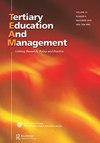高等学校与外部实体开展合作的好处、限制和措施
IF 1.6
Q2 EDUCATION & EDUCATIONAL RESEARCH
引用次数: 12
摘要
在知识经济中,高等教育机构与外部实体之间的合作是所有经济实体和整个社会成功的先决条件。这项研究的目的是确定、分析和评价高等教育机构与外部实体之间合作的好处和限制因素,并从在捷克共和国开展活动的公立、州立和私立高等教育机构的管理人员的角度确定有助于发展这种合作的措施。研究表明,高等教育管理者认为合作对学生、学者和研究人员的知识和经验发展的贡献是最重要的利益。从他们的观点来看,最重要的限制因素是教师/工作人员的时间有限,财政资源不足以及合作的行政要求。国家公共资源或欧盟的财政支持,或利用与为外部实体工作的毕业生的联系,将最能促进合作的发展。本文章由计算机程序翻译,如有差异,请以英文原文为准。
Benefits, limitations and measures concerning the development of cooperation between higher education institutions and external entities
Cooperation between higher education institutions and external entities is a prerequisite for the success of all economic entities and society as a whole in any knowledge-based economy. The aim of the study was to identify, analyze and evaluate the benefits of, and factors limiting, cooperation between higher education institutions and external entities, and identify measures that would contribute to the development of this cooperation from the perspective of managers of public, state and private higher education institutions carrying out activities in the Czech Republic. The study shows that higher education managers consider the contribution to the development of knowledge and experience of students, academics and researchers to be the most important benefit of cooperation. From their point of view, the most significant limiting factors are the limited time availability of faculty/staff, insufficient financial resources and the administrative demands of cooperation. The development of cooperation would be most enhanced by financial support from national public sources or the EU, or through the use of contacts with graduates working for external entities.
求助全文
通过发布文献求助,成功后即可免费获取论文全文。
去求助
来源期刊

Tertiary Education and Management
EDUCATION & EDUCATIONAL RESEARCH-
CiteScore
3.00
自引率
0.00%
发文量
15
期刊介绍:
Tertiary Education and Management (TEAM) is an international, interdisciplinary and peer-reviewed journal that welcomes research contributions that reflect upon, study or question main developmental trends and practices, and address current and future challenges in higher education. The thematic focus of TEAM includes management, governance and organisation of higher education; teaching and learning in higher education; the academic profession and academic careers; higher education and the labour market; and institutional research in higher education. TEAM is jointly published by Springer and EAIR – The European Higher Education Society, and is intended to contribute to EAIR’s mission of creating a better linkage of research, policy and practice in higher education.Articles submitted should as a consequence be written for, understood by, and be relevant for a multicultural, multifaceted and international audience, consisting of both the international academic community and the field of practice within higher education. TEAM welcomes articles using a variety of approaches, methods and perspectives given that the article demonstrate the relevance of the research in a broader context whether this be in other higher education institutions, other national settings or in the international arena. Occasionally, the journal also publishes articles where personal viewpoints/experiences or political arguments are made to stimulate discussion and reflection, or to challenge established thinking in the field of higher education. Such pieces are published in a dedicated ''Forum'' section of the journal.
 求助内容:
求助内容: 应助结果提醒方式:
应助结果提醒方式:


